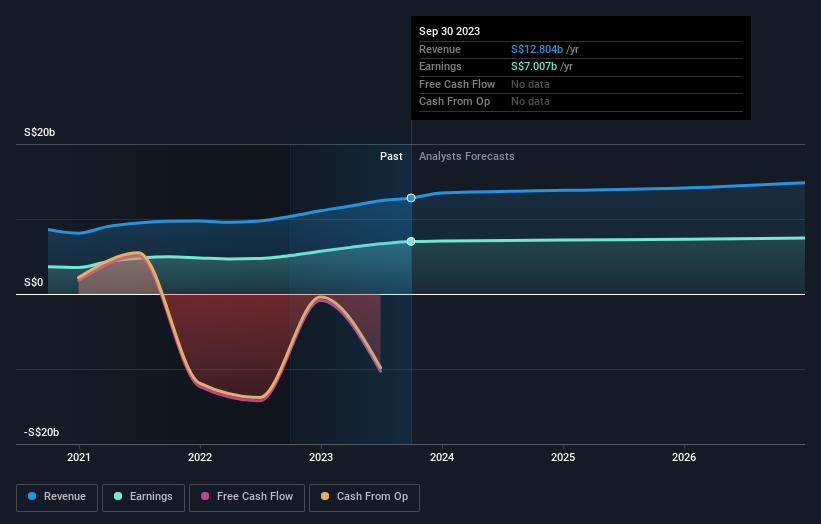Retail investors account for 55% of Oversea-Chinese Banking Corporation Limited's (SGX:O39) ownership, while private companies account for 23%

Key Insights
- The considerable ownership by retail investors in Oversea-Chinese Banking indicates that they collectively have a greater say in management and business strategy
- A total of 25 investors have a majority stake in the company with 41% ownership
- 21% of Oversea-Chinese Banking is held by Institutions
Every investor in Oversea-Chinese Banking Corporation Limited (SGX:O39) should be aware of the most powerful shareholder groups. We can see that retail investors own the lion's share in the company with 55% ownership. Put another way, the group faces the maximum upside potential (or downside risk).
And private companies on the other hand have a 23% ownership in the company.
Let's take a closer look to see what the different types of shareholders can tell us about Oversea-Chinese Banking.
View our latest analysis for Oversea-Chinese Banking

What Does The Institutional Ownership Tell Us About Oversea-Chinese Banking?
Institutional investors commonly compare their own returns to the returns of a commonly followed index. So they generally do consider buying larger companies that are included in the relevant benchmark index.
Oversea-Chinese Banking already has institutions on the share registry. Indeed, they own a respectable stake in the company. This implies the analysts working for those institutions have looked at the stock and they like it. But just like anyone else, they could be wrong. If multiple institutions change their view on a stock at the same time, you could see the share price drop fast. It's therefore worth looking at Oversea-Chinese Banking's earnings history below. Of course, the future is what really matters.

We note that hedge funds don't have a meaningful investment in Oversea-Chinese Banking. The company's largest shareholder is Selat (Pte) Limited, with ownership of 14%. With 4.5% and 3.5% of the shares outstanding respectively, Lee Foundation States Of Malaya, Endowment Arm and Singapore Investments (Pte) Limited are the second and third largest shareholders.
On studying our ownership data, we found that 25 of the top shareholders collectively own less than 50% of the share register, implying that no single individual has a majority interest.
While it makes sense to study institutional ownership data for a company, it also makes sense to study analyst sentiments to know which way the wind is blowing. There are a reasonable number of analysts covering the stock, so it might be useful to find out their aggregate view on the future.
Insider Ownership Of Oversea-Chinese Banking
The definition of an insider can differ slightly between different countries, but members of the board of directors always count. The company management answer to the board and the latter should represent the interests of shareholders. Notably, sometimes top-level managers are on the board themselves.
Insider ownership is positive when it signals leadership are thinking like the true owners of the company. However, high insider ownership can also give immense power to a small group within the company. This can be negative in some circumstances.
Our data suggests that insiders own under 1% of Oversea-Chinese Banking Corporation Limited in their own names. But they may have an indirect interest through a corporate structure that we haven't picked up on. Being so large, we would not expect insiders to own a large proportion of the stock. Collectively, they own S$185m of stock. Arguably recent buying and selling is just as important to consider. You can click here to see if insiders have been buying or selling.
General Public Ownership
The general public, mostly comprising of individual investors, collectively holds 55% of Oversea-Chinese Banking shares. With this amount of ownership, retail investors can collectively play a role in decisions that affect shareholder returns, such as dividend policies and the appointment of directors. They can also exercise the power to vote on acquisitions or mergers that may not improve profitability.
Private Company Ownership
Our data indicates that Private Companies hold 23%, of the company's shares. It might be worth looking deeper into this. If related parties, such as insiders, have an interest in one of these private companies, that should be disclosed in the annual report. Private companies may also have a strategic interest in the company.
Next Steps:
It's always worth thinking about the different groups who own shares in a company. But to understand Oversea-Chinese Banking better, we need to consider many other factors. For example, we've discovered 1 warning sign for Oversea-Chinese Banking that you should be aware of before investing here.
If you are like me, you may want to think about whether this company will grow or shrink. Luckily, you can check this free report showing analyst forecasts for its future.
NB: Figures in this article are calculated using data from the last twelve months, which refer to the 12-month period ending on the last date of the month the financial statement is dated. This may not be consistent with full year annual report figures.
New: AI Stock Screener & Alerts
Our new AI Stock Screener scans the market every day to uncover opportunities.
• Dividend Powerhouses (3%+ Yield)
• Undervalued Small Caps with Insider Buying
• High growth Tech and AI Companies
Or build your own from over 50 metrics.
Have feedback on this article? Concerned about the content? Get in touch with us directly. Alternatively, email editorial-team (at) simplywallst.com.
This article by Simply Wall St is general in nature. We provide commentary based on historical data and analyst forecasts only using an unbiased methodology and our articles are not intended to be financial advice. It does not constitute a recommendation to buy or sell any stock, and does not take account of your objectives, or your financial situation. We aim to bring you long-term focused analysis driven by fundamental data. Note that our analysis may not factor in the latest price-sensitive company announcements or qualitative material. Simply Wall St has no position in any stocks mentioned.
About SGX:O39
Oversea-Chinese Banking
Engages in the provision of financial services in Singapore, Malaysia, Indonesia, Greater China, rest of the Asia Pacific, and internationally.
Flawless balance sheet average dividend payer.


